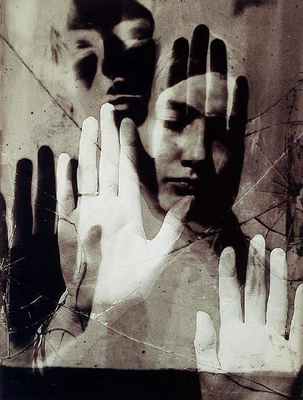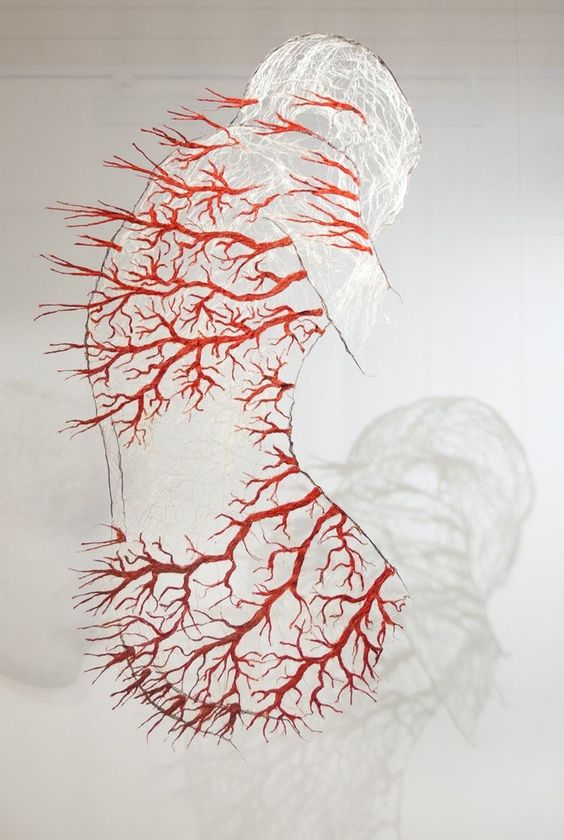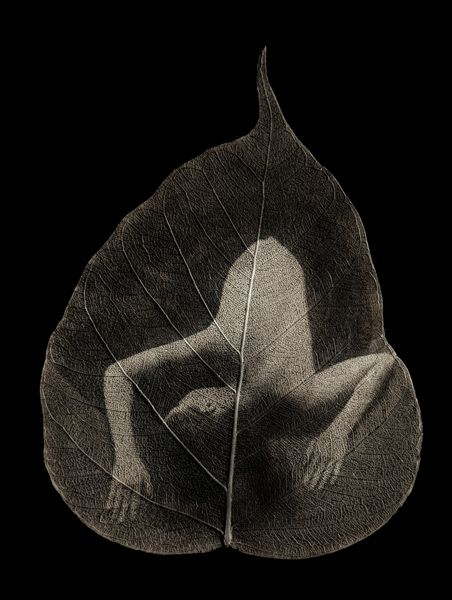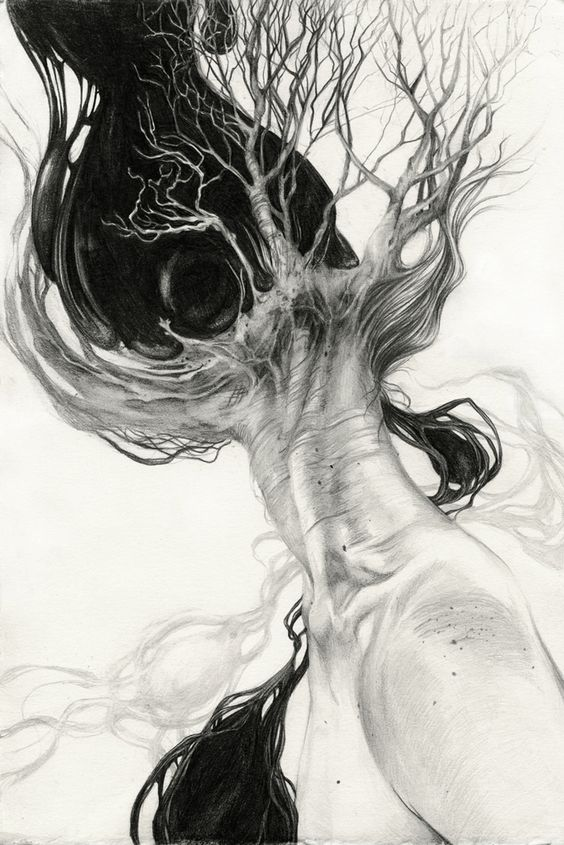

Podía sentir el corazón revoloteando en su pecho como un pájaro enjaulado cansado de la prisión. Era tan doloroso que por un momento creyó que algo malo le estaba pasando, lo que le llevó a preguntarse si así se sentiría tener un infarto. Dirigió la mano a su costado izquierdo, como si así pudiese verificar que todo estuviera bien, pero lo único que consiguió fue salir volando de la bicicleta. No había notado el bache que había en el camino.
En un segundo todo se volvió confuso. La mirada, inestable, traía imágenes de prisa de las cosas que había a su alrededor. Después, todo fue oscuridad. Cuando por fin estuvo estable en el suelo y asimiló que se había caído, sintió el líquido caliente que bajaba de su frente y se introducía por su boca, produciéndole un sabor metálico y desagradable, y la incertidumbre de no saber cuán profundo era el corte.
Pronto escuchó los pasos que se acercaban, seguidos de voces que le gritaban cosas que no lograba entender. Todos hablaban al mismo tiempo. Nunca olvidó que la estaban persiguiendo, pero fue ingenua al creer que al menos tardarían un poco más en llegar. Como por instinto, miró hacia los lados para ver si había dónde esconderse, pero era inútil. Estaba en el medio de la nada, y la tierra no podía tragársela por arte de magia.
Como hienas, se acercaron los chicos. Uno a uno, le profirieron sus ofensas y burlas. Uno de ellos le dio una patada en el pie, y se hubiese ensañado de no ser porque el jefe de la pandilla lo detuvo con una señal. Este era un chico no más alto que ella, pero con seguidores. Tenía los cabellos oscuros y piel tostada por el sol. Una mirada aguda que no vacilaba cuando la acosaba, y una cadena plateada que relucía en su cuello siempre que se encontraba expuesto al sol, como en ese momento.
La autoridad que emanaba de él hacía que los chicos no cuestionaran sus decisiones, aunque les costó entender por qué, después de que les había sido tan difícil atrapar a la “valiente”, este les había pedido que la dejaran en paz por este día. Después, les había ordenado que se adelantaran.
—Es más divertido cuando te defiendes —admitió el chico.

He could feel his heart fluttering in his chest like a prison-weary caged bird. It was so painful that for a moment he thought something bad was happening to him, which led him to wonder if this was what it would feel like to have a heart attack. He directed his hand to his left side, as if that way he could check to make sure everything was okay, but all he managed to do was fly off the bike. He hadn't noticed the bump in the road.
In a second everything became confused. The gaze, unsteady, brought rushing images of the things around him. After that, everything was darkness. When he was finally stable on the ground and assimilated that he had fallen, he felt the hot liquid flowing down from his forehead and into his mouth, producing a metallic and unpleasant taste, and the uncertainty of not knowing how deep the cut was.
Soon he heard footsteps approaching, followed by voices shouting things he couldn't understand. They were all talking at the same time. She never forgot that she was being chased, but she was naive to believe that they would at least take a little longer to arrive. As if by instinct, she looked sideways to see if there was somewhere to hide, but it was no use. She was in the middle of nowhere, and the earth could not magically swallow her up.
Like hyenas, the boys approached him. One by one, they proffered their offenses and taunts. One of them kicked her foot, and would have raged on had not the gang leader stopped him with a signal. This was a boy no taller than she was, but with a following. He had dark hair and sun-browned skin. A sharp gaze that did not waver when he stalked her, and a silver chain that glinted on his neck whenever he was exposed to the sun, as at that moment.
The authority that emanated from him made the boys not question his decisions, although it was hard for them to understand why, after it had been so difficult for them to catch the "brave one", he had asked them to leave her alone for the day. Then he had ordered them to go ahead.
—It's more fun when you stand up for yourself —the boy admitted.

Alma lo miró desde abajo sin moverse. Hubiese odiado limpiarse la sangre frente a él. La mirada que le dirigió, sin embargo, era desafiante, el gesto que más la caracterizaba era esas cejas fruncidas que dejaban ver la ira que emanaba de ella, gesto que ahora mostraba.
Él sonrió, luego se marchó junto a los suyos. Así, sin más.
Solo en ese momento Alma se permitió ver qué daños tenía. Se había hecho una cortada en el cuero cabelludo, se había roto el labio, raspado la rodilla y las palmas de las manos. La bicicleta también había sufrido daños, notó cuando se levantó. Pero sin duda, lo que más le dolía era que los auriculares y el teléfono habían quedado aplastados por su cuerpo.
Cuando intentó probar si la música funcionaba, los auriculares le traían sonidos lejanos que se hacían fuertes de repente y volvían a marcharse. Suspiró. Se conformó con eso por esta vez, ya no tenía ganas de remediar nada.
Así recorrió el resto del camino hasta su casa, cojeando, con la ropa llena de polvo y sangre, empujando la bicicleta y escuchando una música que no le llegaba de forma clara pero que estaba allí, presente. La música era lo único a lo que se aferraba en sus días. Sus auriculares eran un tesoro importante, sin embargo, no estaba de ánimos para llorar por su pérdida. Ya tenía otras cosas por las que ponerse triste.
Cuando abrió la verja del jardín y entró en la casa, la recibió la oscuridad y el silencio. Buscó el botiquín de primeros auxilios y se encerró en su cuarto, donde estuvo un buen rato curándose las heridas. Cuando al fin estuvo limpia y con las heridas tratadas, se miró al espejo. Se tocó la parte del cuero cabelludo y sus ojos se encontraron con sus ojos en el reflejo, estaban secos. Había olvidado cuándo fue la última vez que había llorado.

Alma watched him from below without moving. She would have hated to wipe her blood in front of him. The look she gave him, however, was defiant, the gesture that characterized her most was those furrowed eyebrows that let you see the anger that emanated from her, a gesture that she now showed.
He smiled, then left with his people. Just like that.
Only at that moment did Alma allow herself to see what damage she had sustained. She had cut her scalp, split her lip, scraped her knee and the palms of her hands. The bicycle had also sustained damage, he noticed when he stood up. But without a doubt, what hurt the most was that his headset and phone had been crushed by his body.
When he tried to test if the music was working, the headphones brought distant sounds that suddenly got loud and then went away again. He sighed. He was content with that for this time, he didn't feel like remedying anything anymore.
And so he rode the rest of the way home, limping, his clothes full of dust and blood, pushing his bicycle and listening to music that did not come clearly to him but was there, present. Music was the only thing he clung to in his days. His headphones were an important treasure, however, he was in no mood to mourn their loss. He already had other things to be sad about.
When she opened the garden gate and entered the house, she was greeted by darkness and silence. She looked for the first aid kit and locked herself in her room, where she spent a long time treating her wounds. When she was finally clean and her wounds treated, she looked at herself in the mirror. She touched her scalp and her eyes met her eyes in the reflection, they were dry. She had forgotten when she had last cried.

Al pasar las horas, escuchó cuando su tía entró a la casa. Salió a ayudarla con las bolsas de las compras, en sus ojeras profundas se notaba lo cansada que estaba. Las horas extras le estaban sentando mal. Antes de que pudiera tomar una de las bolsas, su tía se quedó paralizada, mirándola con sorpresa.
—Me caí de la bicicleta —dijo Alma rápidamente—. Pero estoy bien. Me curé las heridas como me enseñaste.
Su tía Paula colocó una expresión que, por unos segundos, no pudo disimular. Alma quería creer que no sabía a qué se debía esa expresión, pero era demasiado lista para no saberlo. También lo era como para no dejarse leer tan fácil por nadie. Así que, pretendió sonreír para tranquilizar a su tía, y la ayudó por fin con las bolsas.
—¿Te fue bien en el trabajo? —preguntó, y le dio la espalda. En ese momento, aprovechó de sacar los productos que había comprado su tía.
—Bien —respondió Paula, y le relató de forma breve las cosas que habían ocurrido en la clínica—. ¿Cómo te fue a ti en el colegio?
—Bien. Hoy saqué la nota máxima en el examen de matemáticas.
Paula sonrió, y la felicitó. Luego se le borró la sonrisa de la cara, y se sumió en sus pensamientos.
—Alma… ¿Te sientes bien aquí? Siento que te dejo sola demasiado tiempo. Además…
—¿De qué hablas? Estoy bien.

As the hours passed, she heard her aunt enter the house. She went out to help her with the shopping bags, her deep circles under her eyes showing how tired she was. The overtime was taking a toll on her. Before she could grab one of the bags, her aunt froze, staring at her in surprise.
-Did you do well at work? -she asked, and turned her back. At that moment, she took the opportunity to take out the products her aunt had bought.I fell off my bike," Alma said quickly. But I'm fine. I treated my wounds like you taught me.
Her Aunt Paula wore an expression that, for a few seconds, she couldn't disguise. Alma wanted to believe she didn't know what that expression was about, but she was too smart not to know. She was also too smart not to be so easily read by anyone. So, she pretended to smile to reassure her aunt, and helped her at last with the bags.
-Did you do well at work? -she asked, and turned her back. At that moment, she took the opportunity to take out the products her aunt had bought.Did you do well at work? -she asked, and turned her back. At that moment, she took the opportunity to take out the products her aunt had bought.
-Well," Paula replied, and told him briefly about the things that had happened at the clinic. How did you do at school?
-Good. I got the highest grade on my math test today.
Paula smiled, and congratulated her. Then the smile was wiped off her face, and she was lost in thought.
-Alma... Do you feel good here? I feel like I leave you alone for too long. Besides...
-What are you talking about? I'm fine.

¿Y qué más podía decirle? Los padres de Alma habían muerto en un accidente hacía poco menos de un año, y se había ido a vivir con su tía en otra ciudad. Su tía, sin embargo, era una mujer sola que tenía que trabajar mucho para salir adelante, y ahora se hacía cargo también de ella. No tenía culpa de que pasara mucho tiempo sola en casa, tampoco de que sus compañeros de clase la acosaran y de que sus padres ya no estuvieran. Era simple.
—Quisiera hacer más por ti —dijo Paula, y sus ojos se enrojecieron. Pretendió que no se le había quebrado la voz, y juntas empezaron a cocinar. Sabía bien que a Alma le incomodaban esas cosas, y lo menos que quería hacer era eso. Pero no podía evitar sentir pena por ella, por lo aparentemente bien que estaba llevando todo el asunto.
Ya en su habitación, Alma se acostó en su cama, dispuesta a dormir. Pero antes, volvió a ponerse los auriculares. Solía escuchar música, aunque fuera una hora antes de dormirse, porque la ayudaba a no pensar. Se sumergía en las melodías, las letras, cerraba los ojos, de ese modo ninguna imagen podía alcanzarla. Solo había oscuridad tras sus párpados, oscuridad y ritmos en ese mundo que había construido.
Los audífonos, para su sorpresa, funcionaban como si nada. Se sintió tan aliviada que apretó el teléfono en su pecho, exhalando. Había sido un día duro como para que también se le fuera arrebatado eso.
Pese a todo, no pudo aguantar despierta ni una hora. Sus ojos se fueron cerrando poco a poco, y su consciencia se fue apagando lo suficiente como para no escuchar los ruidos que provenían de los auriculares. Estuvieron así toda la noche, como una radio cuando tiene interferencia. Las voces empezaron después, pero para este punto Alma ya no retornaría del sueño en el que se había sumido.

And what else could I tell her? Alma's parents had died in an accident a little less than a year ago, and she had gone to live with her aunt in another city. Her aunt, however, was a single woman who had to work hard to get by, and now she was taking care of her too. It was not her fault that she spent a lot of time alone at home, nor was it her fault that her classmates bullied her and that her parents were no longer around. It was simple.
-I'd like to do more for you," Paula said, and her eyes reddened. She pretended her voice hadn't broken, and together they began to cook. She knew well that Alma was uncomfortable with such things, and the least she wanted to do was that. But he couldn't help feeling sorry for her, for how seemingly well she was handling the whole thing.
Once in her room, Alma lay down on her bed, ready to sleep. But first, she put her headphones back on. She used to listen to music, even if it was only an hour before falling asleep, because it helped her not to think. She immersed herself in the melodies, the lyrics, closed her eyes, so that no image could reach her. There was only darkness behind her eyelids, darkness and rhythms in that world she had built.
The headphones, to her surprise, worked as if nothing had happened. She was so relieved that she pressed the phone to her chest, exhaling. It had been a hard day to have that taken away from her as well.
Nevertheless, she could not stay awake for an hour. Her eyes gradually closed, and her consciousness faded enough that she could no longer hear the noises coming from the headphones. They stayed that way all night, like a radio when it has interference. The voices started later, but by this point Alma would no longer return from the sleep she had fallen into.

Esta publicación ha recibido el voto de Literatos, la comunidad de literatura en español en Hive y ha sido compartido en el blog de nuestra cuenta.
¿Quieres contribuir a engrandecer este proyecto? ¡Haz clic aquí y entérate cómo!
¡Gracias! :)